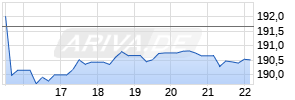
J.P. Morgan Asset Management Launches Ultra-Short Income ETF
PR Newswire
NEW YORK, May 19, 2017
NEW YORK, May 19, 2017 /PRNewswire/ -- J.P. Morgan Asset Management today announced the launch of the JPMorgan Ultra-Short Income ETF (JPST), an actively managed ETF that seeks to provide current income while maintaining low volatility of principal.
The strategy takes a conservative approach and is designed to provide additional income beyond that of money market funds, while mitigating volatility and limiting duration exposure. It invests across sectors, but primarily focuses on corporate and investment grade credit.
JPST leverages the expertise of J.P. Morgan's Global Liquidity business, with over 145 dedicated investment professionals and 30 years of demonstrated results across market cycles. The team is led by David Martucci, Global Head of the Managed Reserves team and portfolio manager.
"J.P. Morgan is a leading global fixed income manager with deep experience in all areas of the market," said Martucci. "The JPMorgan Ultra-Short Income ETF is a natural extension of our well-established Global Liquidity platform and offers our clients another smart option."
"JPST taps into J.P. Morgan's deep bench of talent and investment capabilities," said Bob Deutsch, U.S. Head of ETFs for J.P. Morgan Asset Management. "In a rising interest rate environment, investors are increasingly looking for a safe haven to park their cash and mitigate risk, and we are proud to offer an innovative solution to help our clients build stronger portfolios."
J.P. Morgan Asset Management's ETF suite features thirteen product offerings with over $1 billion in assets under management. J.P. Morgan achieved a top ten position in flows across smart beta ETFs in 2016, ranking 8th out of 47 ETF managers1. J.P. Morgan was also named one of the "Most Trusted" ETF providers according to Cogent Reports' 2016 Advisor Brandscape report2 and was awarded "Most innovative equity ETF – performance" award by Fund Action for its JPMorgan Diversified Return Global Equity (JPGE) product3. In 2017, JPMorgan Diversified Alternatives ETF (JPHF) was awarded "Best new alternatives ETF4" and "Best new active ETF5" by ETF.com.
About J.P. Morgan Asset Management
J.P. Morgan Asset Management, with assets under management of $1.5 trillion (as of March 31, 2017), is a global leader in investment management. J.P. Morgan Asset Management's clients include institutions, retail investors and high-net worth individuals in every major market throughout the world. J.P. Morgan Asset Management offers global investment management in equities, fixed income, real estate, hedge funds, private equity and liquidity. JPMorgan Chase & Co. (NYSE: JPM), the parent company of J.P. Morgan Asset Management, is a leading global financial services firm with assets of approximately $2.5 trillion (as of March 31, 2017) and operations in more than 60 countries. Information about JPMorgan Chase & Co. is available at www.jpmorganchase.com.
Investors should carefully consider the investment objectives and risks as well as charges and expenses of the fund before investing. The summary and full prospectuses contain this and other information about the fund. Read the prospectus carefully before investing. Call 1-844-4JPM-ETF or visit jpmorganetfs.com to obtain a prospectus.
1 Bloomberg as of 12/31/16
2 Cogent Wealth Reports, Advisor Brandscape® published June 2016, sample size 1,500+. Detailed annual report covering the advisor market place. Holistic view of the landscape including practice models, product usage, brand perceptions and user experience across all of the top providers in the MF, VA and ETF categories. Advisor research allows subscribing firms to get a full picture of the advisor marketplace via a mix of continuous online data portals and traditional printed reports. Insights are based on online surveys among representative cross sections of registered financial advisors with at least $5 million in assets under management across all channels.
3 Fund Action ETF US Performance Awards 2016: The ETF awards are judged based on performance and/or asset flows over a 12 month period ending in September 2015. Data from earlier periods can be used to provide context, but will not be central to the judging decision. As well as performance data, judges will also consider the management firm's and fund's reputation in the market place – will give credit to managers who have shown innovation in new products and fee offerings, etc. The awards will only be given to those firms who can demonstrate solid performance, positive asset flows and real credibility among advisors and investors. There is no minimum asset size required for any category.
JPGE inception date is 6/16/14. As of 12/31/16, JPGE returns at NAV were 5.79% 1-year and 2.49% since inception. JPGE market price returns were 5.80% 1-year and 2.61% since inception. FTSE Developed Diversified Factor Index returns were 5.92% 1-year and 2.83% since JPGE inception. FTSE Developed Index returns were 7.55% 1-year and 2.40% since JPGE inception. Gross expense ratio: 0.93%.
4 Awarded to the most important alternatives ETF launched in 2016.
5 Awarded to the most important new actively managed ETF launched in 2016, regardless of asset class. Only ETFs with inception dates after Dec. 31, 2015, were eligible. ETF must be classified as "Active per SEC" by FactSet to qualify.
ETF.com Award winners are selected in a three-part process designed to leverage the insights and opinions of leaders throughout the ETF industry. Step 1: The awards process began with an open nomination period running from Dec. 5, 2016, through Jan. 4, 2017. ETF.com received hundreds of nominations from participants in all corners of the ETF space. Step 2: Following the open nominations process, the ETF.com Awards Nominating Committee-made up of senior leaders at ETF.com, Inside ETFs and FactSet-voted to select up to five finalists in each category. Votes were tallied on a majority basis. Step 3: Winners from these finalists were selected by a majority vote of the ETF.com Awards Selection Committee, a group of independent ETF experts. Committee members recused themselves from voting in any category in which they or their firms appeared as finalists. Ties were decided where possible with head-to-head runoff votes. Voting was completed by Jan. 20, 2017, but results were kept secret until their announcement at the ETF.com U.S. Awards Dinner on March 30, 2017.
The performance quoted is past performance and is not a guarantee of future results. Investment returns and principal value of an investment will fluctuate so that an investor's shares, when redeemed, may be worth more or less than original cost. Current performance may be higher or lower than the performance data shown. For performance current to the most recent month-end please call 1-844-4JPM-ETF.
Investing involves risk, including possible loss of principal.
JPMorgan Ultra-Short Income ETF (JPST)
RISK SUMMARY
- Investing involves risk, including possible loss of principal. Investment returns and principal value of an investment will fluctuate so that an investor's shares, when sold or redeemed, may be worth more or less than their original cost. ETF shares are bought and sold throughout the day on an exchange at market price (not NAV) through a brokerage account, and are not individually redeemed from the fund. Shares may only be redeemed directly from a fund by Authorized Participants, in very large creation/redemption units. For all products, brokerage commissions will reduce returns.
- Investments in bonds and other debt securities will change in value based on changes in interest rates. If rates rise, the value of these investments generally drops.
- Mortgage- and asset-backed securities may decline in value, face valuation difficulties, become more volatile and/or become illiquid. They are also subject to prepayment risk, which occurs when mortgage holders refinance or otherwise repay their loans sooner than expected, creating an early return of principal to holders of the loans.
- Because the Fund may invest a significant portion of its assets in securities of companies in the banking industry, developments affecting the banking industry may have a disproportionate impact on the Fund.
- International investing involves a greater degree of risk and increased volatility. Changes in currency exchange rates and differences in accounting and taxation policies outside the U.S. can raise or lower returns.
- Also, some overseas markets may not be as politically and economically stable as the United States and other nations. Emerging markets involve heightened risks related to the same factors as well as increased volatility and decreased trading volume.
- Derivatives may be riskier than other types of investments because they may be more sensitive to changes in economic or market conditions than other types of investments and could result in losses that significantly exceed the Fund's original investment.
- The Fund is actively managed and there is no guarantee the Fund will achieve its investment objective. Actively managed funds typically charge more than index-linked products.
- Diversification may not protect against market loss.
JPHF - JPMorgan Diversified Alternatives ETF
RISK SUMMARY
- Investing involves risk, including possible loss of principal. Investment returns and principal value of an investment will fluctuate so that an investor's shares, when sold or redeemed, may be worth more or less than their original cost. ETF shares are bought and sold throughout the day on an exchange at market price (not NAV) through a brokerage account, and are not individually redeemed from the fund. Shares may only be redeemed directly from a fund by Authorized Participants, in very large creation/redemption units. For all products, brokerage commissions will reduce returns.
- The Securities and Exchange Commission (SEC) and financial industry regulatory authorities in other countries may impose prohibitions, restrictions or other regulatory requirements on short sales, which could inhibit the ability of the adviser to enter into short sale transactions on behalf of the Fund.
- The Fund's investments in bonds and other debt securities will change in value based on changes in interest rates. If rates rise, the value of these investments generally drops. The Fund may also invest in securities including junk bonds, loans and instruments that are issued by companies that are highly leveraged, less creditworthy or financially distressed. These investments are considered to be speculative and are subject to greater risk of loss, greater sensitivity to interest rate and economic changes, valuation difficulties and potential illiquidity. Loans are subject to additional risks including subordination to other creditors, no collateral or limited rights in collateral, lack of a regular trading market, extended settlement periods, liquidity risks and lack of publicly available information.
- International investing involves a greater degree of risk and increased volatility. Changes in currency exchange rates and differences in accounting and taxation policies outside the U.S. can raise or lower returns. Also, some overseas markets may not be as politically and economically stable as the United States and other nations. Emerging markets involve heightened risks related to the same factors as well as increased volatility and decreased trading volume.
- Investing in alternative assets involves higher risks than traditional investments and is suitable only for sophisticated investors. Alternative investments involve greater risks than traditional investments and should not be deemed a complete investment program. They are not tax efficient and an investor should consult with his/her tax advisor prior to investing. Alternative investments have higher fees than traditional investments and they may also be highly leveraged and engage in speculative investment techniques, which can magnify the potential for investment loss or gain. The value of the investment may fall as well as rise and investors may get back less than they invested.
- Alternative investment strategies use a variety of complicated investment techniques and involve complex securities transactions that include risks in addition to those risks with direct investments in securities described in the prospectus.
- The Fund may invest in futures contracts, options, swaps, forwards and other derivatives. Many derivatives create leverage thereby causing the Fund to be more volatile than it would be if it had not used derivatives. Derivatives may be more sensitive to changes in economic and market conditions and could result in losses that significantly exceed the Fund's original investment.
- The Fund may use derivatives in connection with its investment strategies. Derivatives may be riskier than other types of investments because they may be more sensitive to changes in economic or market conditions than other types of investments and could result in losses that significantly exceed the Fund's original investment. Many derivatives will give rise to a form of leverage. Derivatives are also subject to the risk that changes in the value of a derivative may not correlate perfectly with the underlying asset, rate or index. The use of derivatives may not be successful, resulting in losses to the Fund, and the cost of such strategies may reduce the Fund's returns. Derivatives also expose the Fund to the credit risk of the derivative counterparty. In addition, the Fund may use derivatives for non-hedging purposes which increases the Fund's potential for loss.
- The Fund could experience a loss and its liquidity may be negatively impacted when selling securities to meet redemption requests by shareholders. The risk of loss increases if the redemption requests are unusually large or frequent or occur in times of overall market turmoil or declining prices. Similarly, large purchases of Fund shares may adversely affect the Fund's performance to the
- extent that the Fund is delayed in investing new cash and is required to maintain a larger cash position than it ordinarily would.
- There is no guarantee that the use of long and short positions will succeed in limiting an investment's exposure to domestic stock market movements, capitalization, sector swings or other risk factors. Investments in a portfolio involved in long and short selling may have higher portfolio turnover rates. This will likely result in additional tax consequences. Short selling involves certain risks, including additional costs associated with covering short positions and a possibility of unlimited loss on certain short sale positions.
- There is no guarantee the Fund will meet its investment objective.
- Diversification may not protect against market loss.
J.P. Morgan Exchange-Traded Funds are distributed by SEI Investments Distribution Co, One Freedom Valley Dr., Oaks, PA 19456 , which is not affiliated with JPMorgan Chase & Co. or any of its affiliates.
To view the original version on PR Newswire, visit:http://www.prnewswire.com/news-releases/jp-morgan-asset-management-launches-ultra-short-income-etf-300460538.html
SOURCE J.P. Morgan Asset Management

Mehr Nachrichten zur JP Morgan Chase Corp. Aktie kostenlos abonnieren
(Mit der Bestellung akzeptierst du die Datenschutzhinweise)

Hinweis: ARIVA.DE veröffentlicht in dieser Rubrik Analysen, Kolumnen und Nachrichten aus verschiedenen Quellen. Die ARIVA.DE AG ist nicht verantwortlich für Inhalte, die erkennbar von Dritten in den „News“-Bereich dieser Webseite eingestellt worden sind, und macht sich diese nicht zu Eigen. Diese Inhalte sind insbesondere durch eine entsprechende „von“-Kennzeichnung unterhalb der Artikelüberschrift und/oder durch den Link „Um den vollständigen Artikel zu lesen, klicken Sie bitte hier.“ erkennbar; verantwortlich für diese Inhalte ist allein der genannte Dritte.




